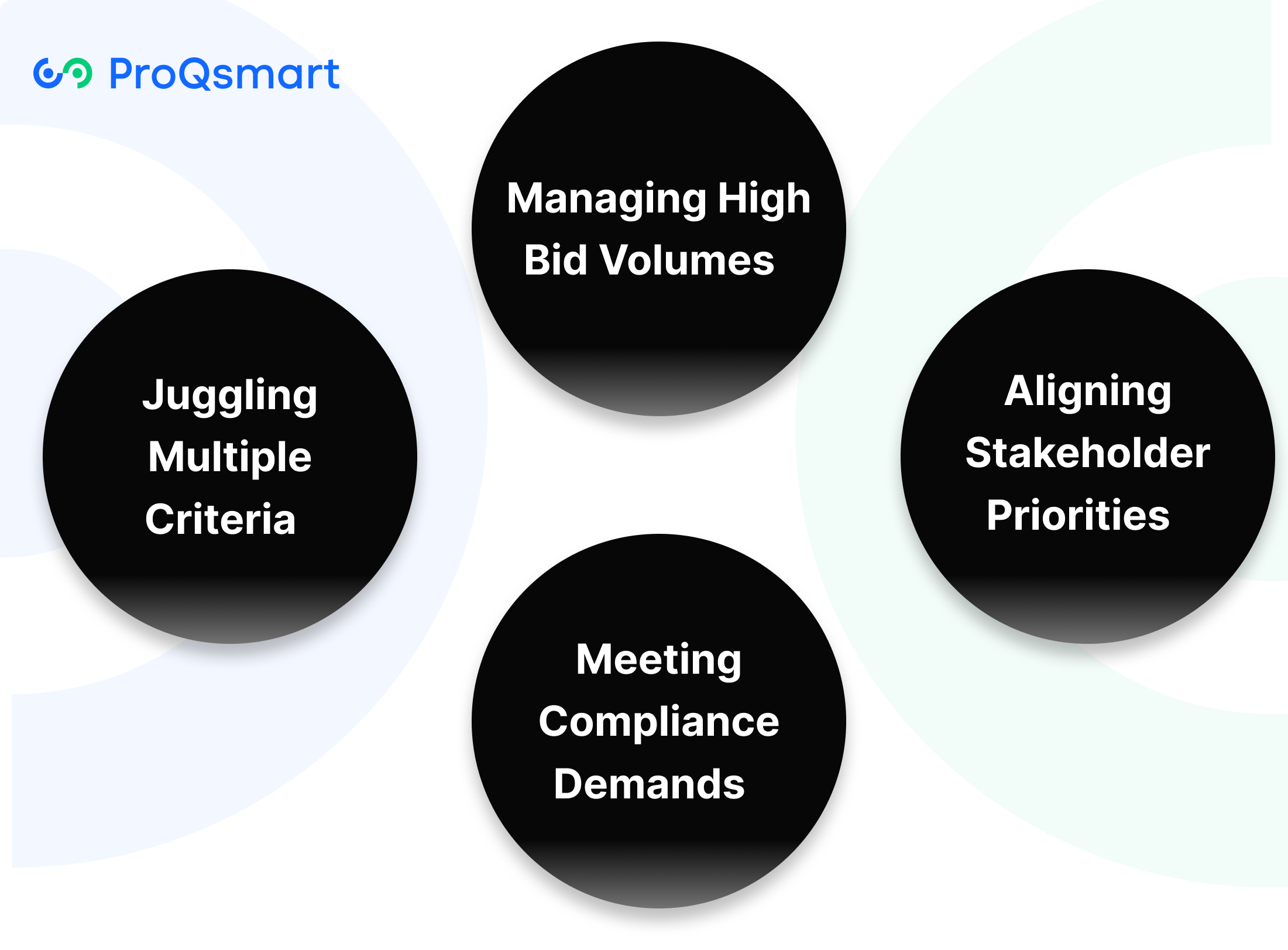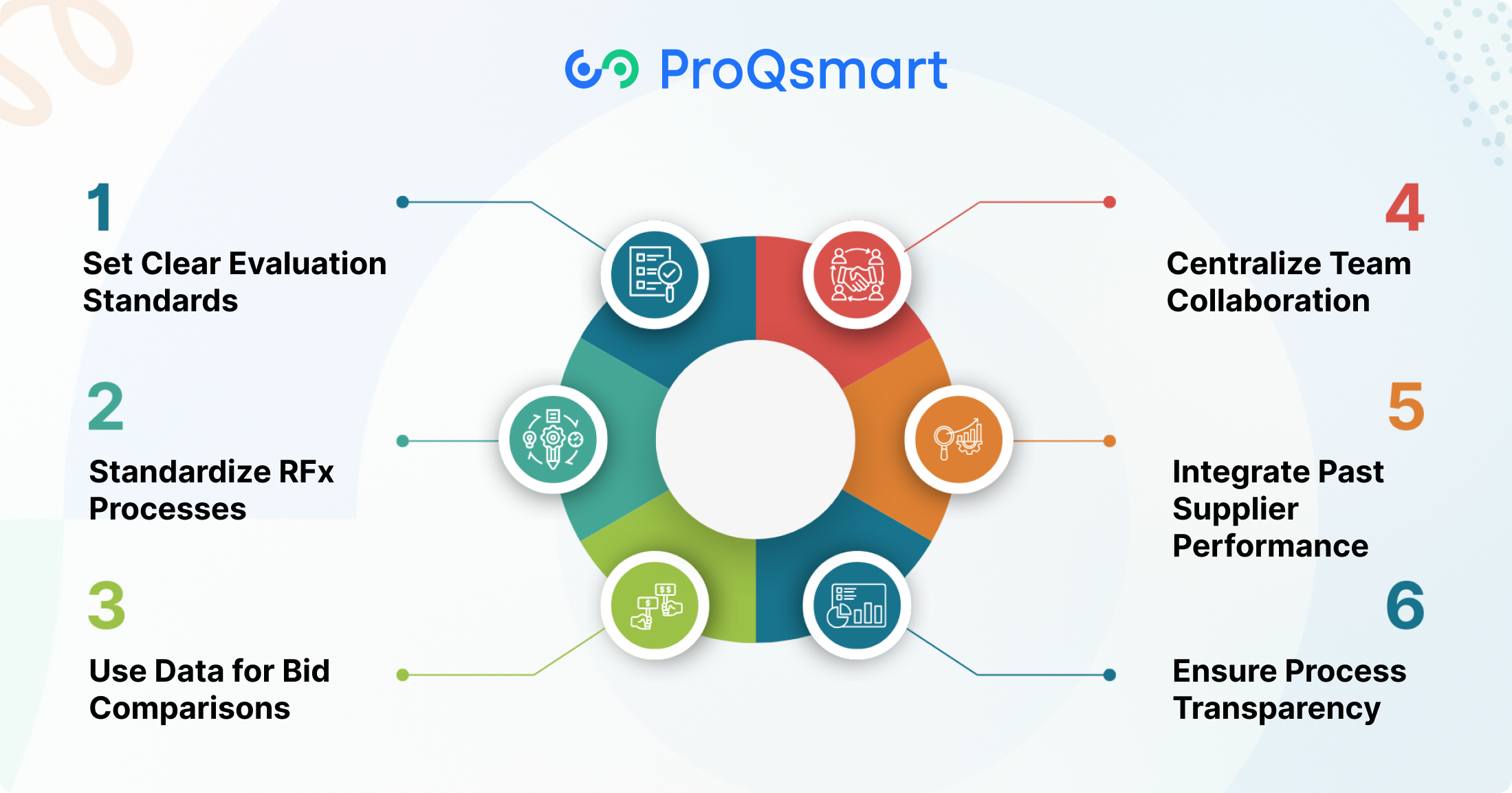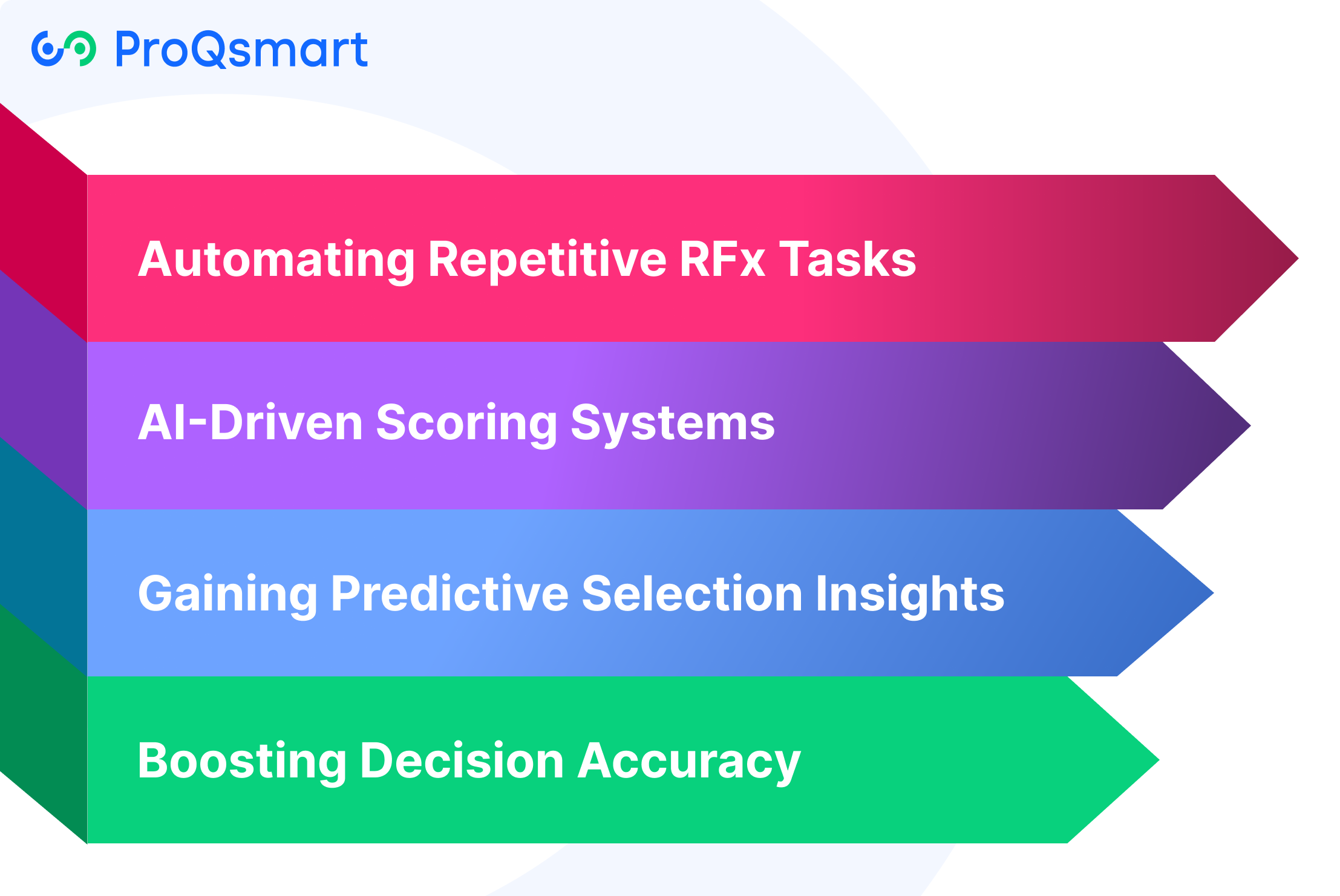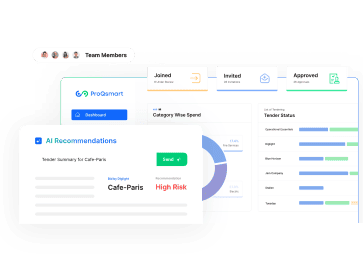Effective bid management plays a critical role in streamlining supplier selection and contract awards, especially in complex sourcing environments. By providing structured processes for filtering bids, evaluating proposals, and verifying vendor compliance with work requirements and pricing standards, bid management ensures organizations make informed, timely, and cost-effective decisions. It also fosters transparency and fairness for all bidders while enhancing collaboration among project managers, procurement teams, and legal counsel.
Leveraging advanced bid management tools and data dashboards, companies can efficiently manage risk, maintain compliance, and generate clear, actionable reports. The following section explores how robust bid management practices drive tangible benefits—from securing better deals to strengthening governance and cross-functional teamwork.
What Is Bid Management?
Bid management is the practice of managing and influencing all aspects of the bidding process for contracts or projects. It walks through every stage, beginning with the initial invitation to bid. Then, it shifts to selecting the best and getting the project rolling.
This process is the beating heart of smart procurement. It holds businesses accountable to selecting suppliers that satisfy their cost and quality needs. When executed effectively, bid management speeds up team productivity. It enables them to identify the most qualified partners and stay competitive in crowded markets.
Core Goals in Supplier Bids
The core purposes in bid management are optimized value and sustained high caliber. Teams are looking for bids that provide competitive pricing, but achieve the highest levels of ability and integrity.
One additional huge goal is to create authentic relationships with vendors. When bid managers set clear boundaries and equitable procedures, vendors feel confident in the process. This trust results in more competitive bids and more efficient projects.
Beyond Simple Cost Cutting
In reality, bid management is about more than saving money. The most successful teams take a holistic approach, balancing factors such as future value, risk, and alignment of vision with suppliers.
That involves building up a process that lets us recycle our lessons from every bid. This allows everyone to save time and brainpower for subsequent rounds.
For example, keeping a set of stock answers or case studies lets teams move faster and answer key client needs in each new bid. Processing bids can take weeks—or months! Knowing what’s coming and exactly what you need to do removes the anxiety and panic scrambling that leads to careless errors.
Why Bid Evaluation Gets Complicated

Bid evaluation is not purely a technical task—it is an arena in which fast-paced, high-stakes procurement occurs. We all know the pain teams go through with changing client expectations, scope creep, and deadline crunches. There’s always the danger of human bias.
Beyond that, we have the problem of processing all of this data. With so many moving parts, even the most seasoned teams can find themselves hitting snags that slow or cloud the process.
Juggling Multiple Criteria
Procurement teams need to balance cost, quality and compliance with each bid. Often, the low price has been paid for in quality, or the best technical proposal is not the most compliant. Stakeholders understandably advocate for their priorities—finance is going to want things to be cheap, operations is going to want the most bang for the buck.
This face-off puts evaluators in a position where it’s difficult to choose a definitive winner. A new construction project might need robust sustainability credentials and a quick turnaround. It’s not possible for every bidder to satisfy both requirements simultaneously.
Managing High Bid Volumes
Bid teams can quickly become overwhelmed with dozens, if not hundreds of responses—each filled with pages and pages of minutiae. Sorting through this inundation is challenging enough, particularly with short turnarounds.
To move faster, teams might implement scoring tools or subdivide tasks to accelerate reviews. The potential to overlook important nuances or make hasty decisions still looms large.
Aligning Stakeholder Priorities
When all of those voices get a chance to weigh in, building consensus can be time-consuming. Meeting before a project is awarded and creating a common scoring rubric can be useful, but differences still often arise.
Collaboration tools and organized feedback cycles help everyone stay on track, especially when people have differing views.
Meeting Compliance Demands
Each bid has to comply with legal, industry, and sometimes local compliance regulations. One small error in missing a compliance box could be the difference in disqualifying a really good offer.
Extensive checklists and legal reviews of compliance requirements are useful, but they further increase the burden and often complicate or delay decision-making.
How to Manage Bids Effectively

Effective bid management requires an approach that combines organization, collaboration, and data-driven insights. Procurement teams are often up against a complicated supplier marketplace, urgent timeframes, and regulatory requirements.
Having a clear process in place reduces any uncertainty and leads to more successful outcomes. Teams break the process into steps:
-
Bid solicitation
-
Submission
-
Selection
-
Contract formation
-
Project delivery
Each phase brings different requirements and hazards, which makes monitoring ongoing progress in real time paramount.
1. Set Clear Evaluation Standards
Having specific clear standards protects your team from bias and keeps them focused. With clear standards, all bidders understand what the focus is on—cost, quality, schedule.
This helps ensure there is no favoritism in scoring or bias in selection.
2. Standardize RFx Processes
Facilitating compliance with standardized RFx templates enhances the entire bidding process, improving efficiency and convenience for bidders and evaluators alike. Uniform bid documents allow for clear comparisons, ensuring no critical bid information is overlooked.
3. Use Data for Bid Comparisons
Data driven teams that engage in data analytics identify the most competitive bids much more quickly. Data-driven insights allow agencies to better balance cost, risk, and value.
Tools like ProQsmart help by automating data analysis and tracking.
4. Centralize Team Collaboration
Centralize team collaboration in a hub where everything stays organized, and everyone stays plugged in throughout the entire bidding process. Time-savings and error-prevention come when you utilize real-time updates and version history, enhancing your bid management strategy.
5. Integrate Past Supplier Performance
Supplier performance evaluation is crucial in the entire bidding process. Teams review historical supplier data to identify those who have a track record of fulfilling their commitments, ensuring a successful bid management strategy.
6. Ensure Process Transparency
Creating a paper trail is essential in the entire bidding process. Audit trails create trust with stakeholders and enable bid managers to defend their decisions.
How AI Automates and Optimizes Bid Management

AI is positively and fundamentally transforming bid management. It allows teams to move quickly, reduce errors, and spend more time on strategic decisions. AI a positive addition that reduces the amount of manual effort and simplifies the entire bid process.
AI-powered tools such as ProQsmart can review bids that have been submitted in the past and instantly pinpoint noncompliance areas. They can explain your chances of winning new work. Previously, crafting winning bids required multiple rounds of revisions and specialist reviews. Now, AI can do most of this, providing teams with a great starting draft quickly and consistently.
Automating Repetitive RFx Tasks
AI can automate a lot of repetitive, daily RFx tasks such as looking up supplier information, completing an RFx form, or responding to basic compliance inquiries. This not only reduces human error but eliminates dozens of hours of tedious manual effort.
For example, ProQsmart automates workflows, making it easier to keep track of documents and timelines. Teams can tackle more high-level strategies when they’re not wasting time on low-level routine checks.
AI-Driven Scoring Systems
AI-powered scoring introduces greater equity and precision to the process. AI-driven scoring systems apply quantifiable rules to data-driven bids, making it harder for results to be biased.
This method guarantees that all of the bids are evaluated by the same criteria. This gives managers confidence in the results and allows them to make more informed selections.
Gaining Predictive Selection Insights
Using AI, teams can leverage historical data to predict supplier performance. Predictive selection tools identify patterns in contract award, delivery period, or non-compliance.
This enables teams to select partners who are most likely to achieve desired outcomes. That way, teams are more able to plan ahead and tackle potential issues before they become surprises.
Boosting Decision Accuracy
AI gives teams the ability to select winners with increased confidence. It identifies opportunities and alerts to dangers in advance. More accurate data and reduced trial-and-error allow decision-makers to make smarter decisions.
Those decisions result in increased win rates and better relationships with vendors.
Key Metrics for Bid Success
At the end of the day, effective bid management is all about having clear, measurable outcomes. For procurement teams, tracking the right metrics is essential to driving strategic decision-making, demonstrating value, and continuously improving.
By using these benchmarks, you can see what’s working, where you need to make adjustments, and how to continue building yourself in a highly competitive market.
Reduced Evaluation Timelines
Reduced Evaluation Timelines Shorter evaluation timelines allow procurement teams to be agile, react to changes in the market and industry, and maintain momentum on critical projects.
A quicker evaluation timeline reduces the risk of bottlenecks and allows teams to move to award before suppliers change their pricing or availability. For instance, one team found that using an automated scoring tool coupled with a detailed checklist reduced review time by several days.
Measuring the average days between bid close and award provides a tangible speedometer for teams. Additionally, it brings transparency to where slowdowns are happening.
Achieved Cost Optimization
Achieved Cost Optimization Saving costs is still the number one goal. Teams monitor their overall spend against their budgets, and how frequently bids are received below their target.
Breaking out direct savings such as lower unit prices is important. Indirect savings like bundled services or improved payment terms come into play here as well.
By tracking these, teams spot which suppliers or tactics really move the needle and can focus efforts where they count.
Improved Supplier Quality
The improved supplier quality Winning bids awarded to the best suppliers. To that end, teams monitor supplier quality, delivery and service performance.
For instance, businesses should measure their suppliers’ defect rates or on-time deliveries providing a better understanding of supplier quality. The long term payoff is a highly competitive supplier base that brings up the entire enterprise.
Compliance Adherence Levels
Teams should be adhering to internal controls and external compliance rules. Compliance adherence levels Metrics that can be measured include the percentage of compliant bids to pre-defined regulations or audits.
High adherence to compliance increases risk mitigation and builds confidence among decision-makers.
The Future of Managing Bids
Bid management is evolving rapidly, as innovative tools, data and values reinvigorating the field continue to emerge. New trends, largely driven by automation and data, are helping to level the playing field and increase transparency within the process. Technology is not only accelerating the pace of bid checks, but it’s opening up new forms of evaluating bids.
These changes are significant for anyone who wishes to remain relevant and lead the future of procurement.
Smarter Automation Ahead
Automation, AI or otherwise, is going to have an increasingly important impact on the way teams manage bids. Very soon, systems will be able to sort these forms. They’ll validate bid rules, flag risks, and compare supplier offers in real-time!
For example, ProQsmart’s AI-driven platformnow lets teams set up bidding, track changes, and keep all files in one place. These tools have prevented unnecessary errors and allowed department staff to focus on more complex nuances. As regulations and projects increase in complexity, automation must be able to match that, ensuring even the largest, most complex, global bids go off without a hitch.
Deeper Data Integration
Effective bid management today is heavily dependent on having real-time, connected data. Imagine data moving from budgets, previous purchases, and supplier ratings into one centralized location. This will enable the bid management team to review bids with greater information on their side.
Rise of Sustainability Criteria
Increasingly, more teams require their suppliers to adhere to environmentally sustainable or equitable labor standards. Bid evaluations increasingly focus on energy consumption, waste generation, and payment of prevailing wage.
Companies that proactively address these concerns can improve their reputations and earn public confidence. Including explicit requirements for these aspects in bids creates a more resilient, competitive, and transparent supply chain.
Evolving Procurement Technology
Cloud-based collaboration tools, artificial intelligence vetting, and real-time chat are changing the way bids can be managed. Teams that are able to quickly adopt these systems are able to identify new opportunities to save money.
Third, they can better monitor competitive bids and perform more efficiently with suppliers. Having a pulse on tech trends ensures a continual leading edge in the field.
Conclusion
Effective bid management is a cornerstone of successful procurement, particularly when navigating the complexities of supplier selection. By implementing structured processes and leveraging advanced technologies, organizations can bring clarity and efficiency to every stage of the evaluation process. AI-powered bid management tools enable teams to rapidly review submissions, detect inconsistencies, and surface valuable insights that might otherwise be missed. This data-driven approach empowers procurement professionals to make well-informed decisions, ensuring that contracts are awarded to suppliers who offer the best combination of value, reliability, and compliance.
Moreover, robust bid management fosters greater transparency and fairness throughout the sourcing process. Clear evaluation criteria, automated compliance checks, and easily digestible reports help maintain objectivity and build trust among all stakeholders—both internal teams and external bidders. Enhanced collaboration across departments, from procurement to legal and project management, further streamlines supplier selection and reduces the likelihood of costly errors or delays.




